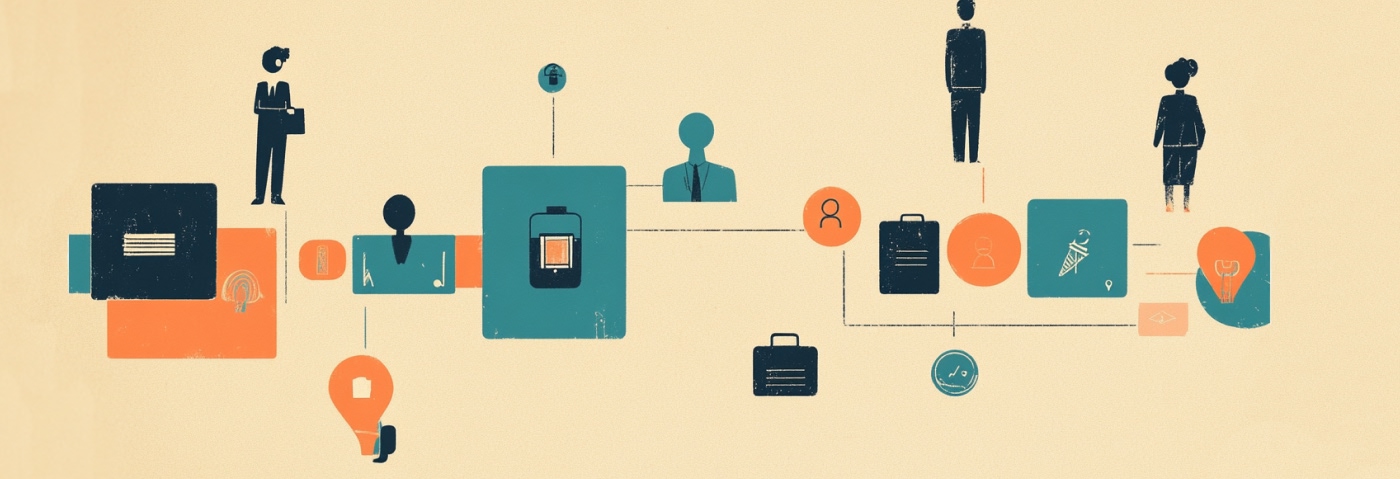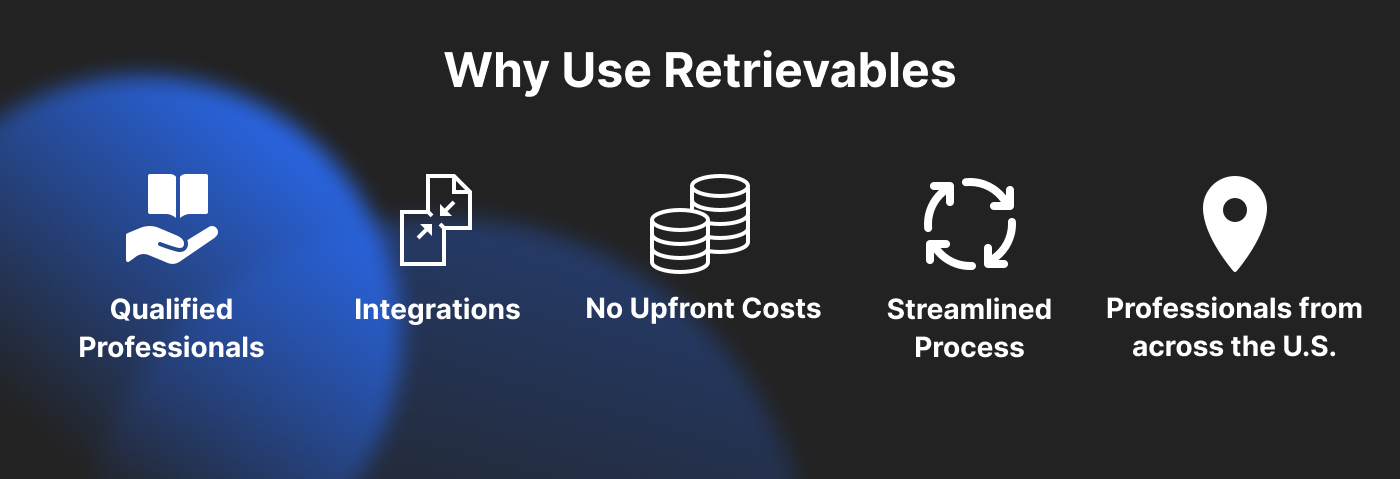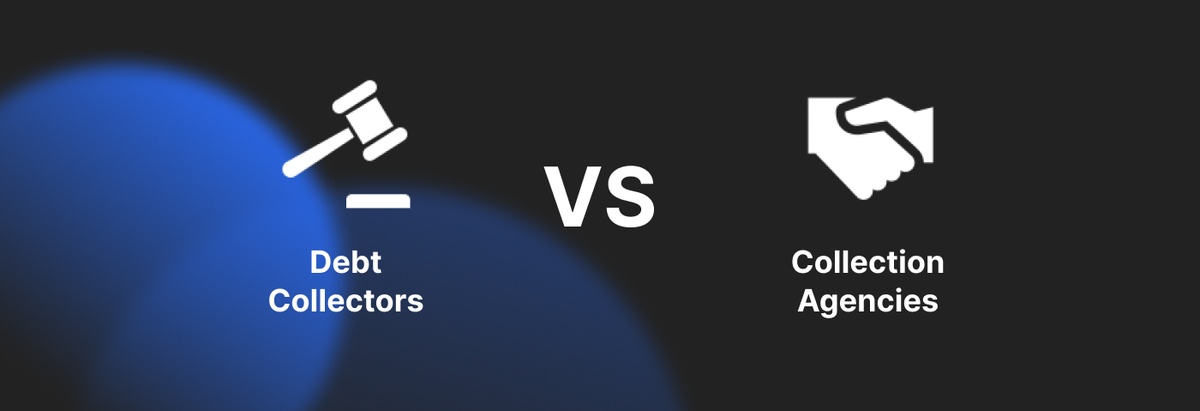Debt Collector vs. Collection Agency: What You Need to Know
For large enterprises, outstanding receivables are more than just unpaid bills; they’re cash flow constraints, risk exposures, and impacts on financial reporting. Knowing when and how to escalate collection, and who to engage, can make a big difference in recovery rates, costs, reputation, and legal risk. Two common terms in this domain are debt collector and collection agency — they are related, but not identical. This article will clarify the differences, help you evaluate your options (including attorneys), and show where Retrievables can assist.
Definitions: Understanding the Terminology
| Term |
Broad Definition |
Key Characteristics |
| Debt Collector |
Any person or entity whose business is collecting debts owed to others, or buying delinquent debt and pursuing it. |
Can include in-house teams, third-party agencies, attorneys, or “debt buyers.” The term is broad. |
| Collection Agency |
A specific kind of debt collector — a business that is engaged mainly in collecting debts on behalf of creditors, usually for a commission or fee. |
Usually not lawyers; their tools are negotiation, reminders, payment plans, communications. They may (in some cases) purchase debt. |
Key Distinctions: What They Can & Cannot Do
Here are the core differences in capabilities, legal authority, cost structure, and risk exposure.
| Dimension |
Collection Agency |
Debt Collector (Attorney / Legal Debt Collector) |
| Legal Authority |
Can send reminders, negotiate, contact debtors by phone, email, letters. They generally cannot initiate legal proceedings (lawsuits, judgments). |
Able to represent you in court; file lawsuits; obtain judgments; enforce judgments (e.g. liens, garnishments, asset seizure, depending on jurisdiction). |
| Regulation & Compliance |
Must abide by applicable debt collection laws, contracts, licensing requirements (varies by country/state). But because they are not legal practitioners, their actions are more limited. |
Attorneys are held to legal and ethical standards, bound by rules of civil procedure, professional conduct rules, privilege, etc. Higher risk exposure if process isn’t followed. |
| Cost Structure |
Usually contingency-based: agency takes a percentage (often 20–50%) of what they actually collect. Minimal or no upfront cost. |
May require retainer fees, hourly rates, costs for court filing, service of process, judgment enforcement, etc.; sometimes hybrid arrangements. Higher upfront cost but potentially better return in complex cases. |
| Speed & Flexibility |
Generally faster to deploy; less formal; lighter procedural requirements. Good for large volume, lower individual value, or when debtor contact is straightforward. |
Slower, because preparing legal actions, filing, discovery etc. But in recalcitrant cases, or where debt is disputed or debtor assets are hidden, the legal avenues are indispensable. |
| Risk & Reputation |
If handled badly, agencies can damage your customer relationships by using overly aggressive tactics, or violate laws (which may lead to penalties, reputational damage). |
More controlled process, legal oversight helps mitigate risk of liability. But legal proceedings themselves can have costs (time, legal fees) and require management attention. |

When to Use Each: Strategic Considerations for Large Enterprises
As an enterprise-level decision maker, your goal is to maximize recoveries, minimize cost & risk, and protect your company’s reputation. Here are considerations for deciding between using a collection agency vs. moving to legal/debt collector (attorney) involvement.
Age and Size of Debt
- Very old debts may have statute of limitations issues; legal action might be impossible.
- For smaller, more numerous accounts: agencies often make more sense.
- For larger accounts (high value, strategic customers), or where significant amounts are in dispute, legal approach may be necessary.
Debtor Behavior & Profile
- If the debtor is responsive, just slow, or needs payment arrangements → agencies, negotiation.
- If debtor is avoiding contact, ignoring demand, hiding assets, disputing the debt → legal tools might be required.
Jurisdiction & Legal Environment
- Laws differ: what collection agencies can do vs. attorneys; licensing requirements; rules on communications; enforcement mechanisms. Be aware of cross-border issues if you have debtors in multiple jurisdictions.
Cost vs. Expected Recovery
- Agencies’ lower cost and speed often mean higher “net” yield for more routine/difficult but less valuable accounts.
- Attorneys slower, more expensive, but higher leverage for larger accounts may justify the cost.
Brand / Customer Relations
- Using agencies en masse can risk alienating customers. Legal action may polarize; however, legal FTC-style protections help.
- Balance assertiveness with preserving long-term relationships — critical especially if debtors are business clients you may want to retain.
Internal Capabilities & Resources
- Do you have an in-house receivables or legal risk team? If yes, legal steps may be more manageable. If not, using external agencies or attorneys is necessary, but due diligence is crucial.

Pros & Cons: Summary
| Approach |
Pros |
Cons |
| Collection Agency |
Lower upfront cost; fast deployment; scalable; good for “easy wins”. Less risk from lawsuit costs. |
Less legal leverage; limited to out-of-court collection; sometimes lower success rates for delinquent/uncooperative debtors; risk of compliance or reputation issues if agency uses aggressive/unethical tactics. |
| Debt Collector (Attorney/Attorney-led) |
Legal power to sue, get judgments, enforce collections; often higher recovery on difficult cases; better tools vs. evasive debtors; more formal / structured process; better risk control. |
Higher cost; longer time to resolve some cases; more complex to manage; possible negative reactions from debtors if litigation required; requires careful selection of attorney and oversight. |
Best Practices: Choosing & Managing Debt Collection Partners
Track Record & Specialisation
- Do they have experience in commercial debt (vs. consumer debt)? The laws, norms, debtor behavior differ.
- Look for firms or agencies with clients of your scale and in your industry.
Legal & Regulatory Compliance Guarantee
- Ensure the partner knows local (and international, if relevant) laws.
- Check licensing, bond requirements, membership of professional associations.
- Make sure practices are ethically sound: communications, data protection, dispute resolution.
Fee Structure & Transparency
- Understand commissions, whether there are hidden fees (e.g. collection efforts, legal filing, service costs).
- With attorneys: know what is retainer, what are costs if litigation is unsuccessful, whether fees are recoverable in judgments.
Enforcement Capabilities
- If you might need legal action, ensure the partner (especially if an attorney) has judgment enforcement tools: asset investigation, lien filings, garnishment, etc.
- Agencies might refer to attorneys when needed — check the quality of those relationships.
Reporting & Analytics
- You need dashboards or reports showing progress: number of accounts passed, recovery rates, aged receivables, success by region or customer type.
- Data helps you decide when to escalate accounts from agency to attorney.
Communication Strategy & Customer Relations
- Tone matters. Even with delinquent accounts, harsh tactics can harm your brand or lead to disputes.
- Choose partners whose approach aligns with your company culture.
- Define escalation paths: when do you stop “friendly reminders,” when to escalate legal.
Scalability & Flexibility
- Your receivables will fluctuate; you’ll want a partner who can scale up (or down) overhead/exertion.
- Ability to tailor the strategy per segment: small vs large debtors, domestic vs international, etc.

How Retrievables Helps
- Commercial Debt Focus: Retrievables specializes in commercial debt collection, not just consumer debt. That means the partners in its network are well-versed in the complexities of business-to-business receivables: disputes, contract terms, cross-jurisdictional issues, debtor creditworthiness.
- Matchmaking / Vetting: Retrievables helps you find the most suitable collection attorney or agency. Because your needs (size of debt, jurisdiction, complexity, risk tolerance) vary, Retrievables acts like a filter and matchmaker: you get connected with options that are already vetted for quality, reputation, legal capability, cost structure.
- Risk Mitigation & Compliance: Through its network, Retrievables ensures that partner agencies or attorneys are compliant with regulation, have strong track records, and their methods are compatible with best practices. This reduces the risk of your company facing legal or reputational fallout.
- Efficient Decision-Making: Instead of individually researching dozens of agencies or legal firms, Retrievables provides you with decision support: comparisons, references, performance metrics. This speeds up contracting, reduces internal resource drain, and often improves negotiation outcomes.
- Cost vs Return Optimization: By helping you select the right partner for the right accounts (e.g. when to use agency, when to escalate to legal), you improve your net recoveries. Retrievables can help you segment your receivables portfolio to deploy resources where they are most cost-effective.

When to Escalate: From Agency to Attorney
In your enterprise receivables lifecycle, it helps to have rules or thresholds for escalation. Some triggers might include:
- The amount owed exceeds a given value (e.g. a threshold where legal action is justified).
- The debtor has ignored repeated collection attempts or reminders.
- The debtor is disputing the debt and requires legal validation.
- Assets need to be identified and seized or collateral enforced.
- The debtor is located in a jurisdiction where legal or regulatory leverage can be effective.
- Time elapsed (e.g. 90-120+ days past due) makes agency efforts less likely to succeed and more costly to maintain.
Case Examples
Here are hypothetical scenarios that illustrate how things play out.
Scenario A: Mid-size Vendor with Moderate Debt
A vendor owes $50,000, past due for 45 days, has communicated before but is slow to pay. Here, an agency is likely cost-effective: reminder letters, negotiation, perhaps structured payment.
Scenario B: Large Corporate Debtor, Contract Disputed
A contract dispute arises, debtor claims contractual breach. Debt is $500,000. You need legal tools, possibly litigation or arbitration. Attorney involvement is warranted.
Scenario C: Multiple Small Debtors, High Volume
You have 1,000 small overdue invoices of €2,000 each. Using in-house or agency resources in batches, automated communication, possibly referring only the hardest cases to attorneys.
Scenario D: Cross-border / International Collections
Debtor in another country, legal enforcement more complex; may need counsel familiar with local laws or cross-border treaties. Agency may help in early stages; an attorney network will be needed for legal recourse.
Legal & Compliance Risks to Watch For
- Jurisdictional Limits: Legal and regulatory regimes differ. What’s allowed in one state or country may be forbidden in another.
- Statutes of Limitations: Legal time limits expire; if you act after that, even an attorney may not be able to get a court judgment.
- Data Protection & Privacy Laws: Debtor data handling, communications, cross-border transfers must comply.
- Fair Debt Practices: Avoid harassment, misleading communications, misleading claims of legal status. Even business debt collection can carry risk if misrepresented.
- Contractual Risks: Your contracts with customers should include clear provisions around payment terms, interest, dispute resolution; these will be material in any legal or collection agency action.

How to Integrate Debt Collection Strategy into Enterprise Financial Management
- Embed receivables ageing and delinquency metrics into financial dashboards.
- Set clear policy thresholds for when to move accounts to agencies or attorneys.
- Allocate budget for legal escalation, including forecasting worst-case costs.
- Ensure legal department involvement (or external legal counsel) when contracts are drafted so that customer agreements support enforceability.
- Train your credit & accounting teams to document contracts, invoices, communications; strong documentation is vital if legal action becomes necessary.
- Monitor performance of agencies and attorneys: recovery percentage, cost per case, time to resolution, satisfaction, compliance.
Conclusion
Understanding the difference between a collection agency and a debt collector (especially when it’s an attorney or legal debt collector) isn’t just semantics; it affects how, when, and at what cost you will collect what your company is owed. For large companies, this is a strategic decision: balancing cost, speed, risk, and reputation.
That’s where a partner like Retrievables can make a real difference: helping you choose the right agency or attorney, for the right debt, under the right conditions.
FAQs
What exactly is a “debt collector” in commercial settings?
A “debt collector” can be any entity — agency, attorney, creditor, or debt buyer — whose business involves pursuing collection of overdue commercial debts. The key is whether they have been engaged to collect debts they did not originate or whether they buy debt and collect for their own account. They may have legal powers (if attorneys) or more limited powers (if agencies).
Is a collection agency the same as a debt collector?
In many cases, the terms overlap. But a collection agency is a subset of debt collectors — specifically those that collect debts on behalf of others, usually without filing lawsuits themselves. Debt collectors may include agencies and attorneys or others with broader legal powers.
When should an enterprise use an attorney instead of a collection agency?
Use an attorney when the debt is large or strategic; when normal agency efforts are exhausted; when there is a dispute or legal complexity; when enforcement (through courts, garnishment, liens, etc.) is needed or likely; or when debtor behavior indicates avoidance or resistance.
What are the cost implications of choosing an attorney vs. agency?
Agencies are usually paid on commission or contingency basis, with lower upfront cost. Attorneys tend to have higher overhead: legal fees, filing fees, possibly retainer, sometimes costs even if legal action fails. But legal involvement may recover more in complex or resistant cases, so ROI should be evaluated.
How does the choice affect customer relationships and reputation?
An agency may be less formal, but if communications are aggressive or tone is poor, it can harm reputation. Legal action is more adversarial and can escalate tensions. The key is choosing a partner who acts professionally, with respect for your brand, and with good communication policies.
What should I look for when selecting a collection attorney or agency partner?
Key criteria: experience in commercial debt; jurisdictional/legal capacity; transparent fees; good references and track-record; compliance practices; enforcement abilities; reporting and analytics; communication style aligning with your brand values; scalability.


















